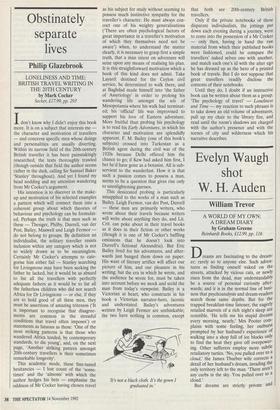Obstinately separate lives
Philip Glazebrook
LONELINESS AND TIME: BRITISH TRAVEL WRITING IN THE 20TH CENTURY by Mark Cocker Secker, £17.99, pp. 293 Idon't know why I didn't enjoy this book more. It is on a subject that interests me the character and motivation of travellers — and concerns specific men whose doings and personalities are usually diverting. Within its narrow field of the 20th-century British traveller it has been painstakingly researched, the texts thoroughly trawled (though outside that field the author seems rather in the dark, calling Sir Samuel Baker `Stanley' throughout). And yet I found my head nodding and my attention wandering from Mr Cocker's argument.
His intention is to discover in the make- up and motivation of his selected examples a pattern which will connect them into a coherent group about which theories of behaviour and psychology can be formulat- ed. Perhaps the truth is that men such as these — Thesiger, Philby, Durrell, van der Post, Bailey, Maxwell and Leigh Fermor do not belong to groups. By definition an individualist, the solitary traveller resists inclusion within any category which is not so widely drawn as to be meaningless. Certainly Mr Cocker's attempts to cate- gorise him either fail — Stanley searching for Livingstone may have been seeking the father he lacked, but it would be as absurd to list all the travellers with perfectly adequate fathers as it would be to list all the fatherless children who did not search Africa for Dr Livingstone — or else, if they are to hold good of all these men, they must be assertions of amazing triteness (It is important to recognise that disagree- ments are common in the stressful conditions that travel often imposes') or statements as fatuous as these: 'One of the most striking patterns is that those who wandered Africa tended, by contemporary standards, to die young', and, on the next page, 'Another striking pattern amongst 20th-century travellers is their sometimes remarkable longevity'.
This academic mode, these fine-tuned hesitancies — I lost count of the 'some- times' and the 'almosts' with which the author hedges his bets — emphasise the oddness of Mr Cocker having chosen travel as his subject for study without seeming to possess much instinctive sympathy for the traveller's character. He must always con- coct one of his weighty generalisations (`There are often psychological factors of great importance in a traveller's motivation of which they themselves need not be aware') when, to understand the matter clearly, it is necessary to grasp first a simple truth, that a man intent on adventure will seize upon any means of realising his plan. It is this straightforward motivation which a book of this kind does not admit. Take Layard: destined for the Ceylon civil service, he determined to walk there, and at Baghdad made himself into 'the father of Assyriology' in order to prolong his wandering life amongst the tels of Mesopotamia where his walk had terminat- ed; his 'official' life was improvised to support his love of Eastern adventure. More fruitful than probing his psychology is to read his Early Adventures, in which his character and motivation are splendidly apparent. F. M. Bailey (one of this book's subjects) crossed into Turkestan as a British agent during the civil war of the 1920s because Delhi offered him the chance to go; if Kew had asked him first, I bet he'd have gone as a botanist. All is sub- servient to the wanderlust. How it is that such a passion comes to possess a man, seems to be a question that gives rise only to unenlightening guesses.
This desiccated probing is particularly misapplied to the works of a man such as Bailey. Leigh Fermor, van der Post, Durrell — these men are primarily writers, who wrote about their travels because writers will write about anything they do, and Lit. Crit. can poke about in their travel books as it does in their fiction or other works (though it is one of Mr Cocker's baffling omissions that he doesn't look into Durrell's fictional Alexandria). But Eric Bailey lived for his adventures, and after- wards just bunged them down on paper. His want of literary artifice will affect our picture of him, and our pleasure in his writing; but the era in which he wrote, and the audience he wrote for, must be taken into account before we mock and scold the man from today's viewpoint. Bailey is a Victorian at heart, who constructs in his book a Victorian narrator-hero, laconic and understated. Bailey's adventures written by Leigh Fermor are unthinkable; the two have nothing in common, except it's not a black cloth. It's the gown I graduated in.' that both are 20th-century British travellers.
Only if the private notebooks of these disparate individualists, the jottings put down each evening during a journey, were to come into the possession of a Mr Cocker — only then, having in hand the raw material from which their published books were fashioned, could he compare the travellers' naked selves one with another, and match each one's id with the alter ego he has dressed up as the hero of a printed book of travels. But I do not suppose that great travellers readily disclose the contents of their notebooks.
Until they do, I doubt if an instructive book can be written about them as a group. `The psychology of travel' — Loneliness and Time — my reaction to such phrases is to take down an old volume of adventures, pull up my chair to the library fire, and read until the room's shadows are charged with the author's presence and with the scenes of city and wilderness which his narrative describes.


































































 Previous page
Previous page